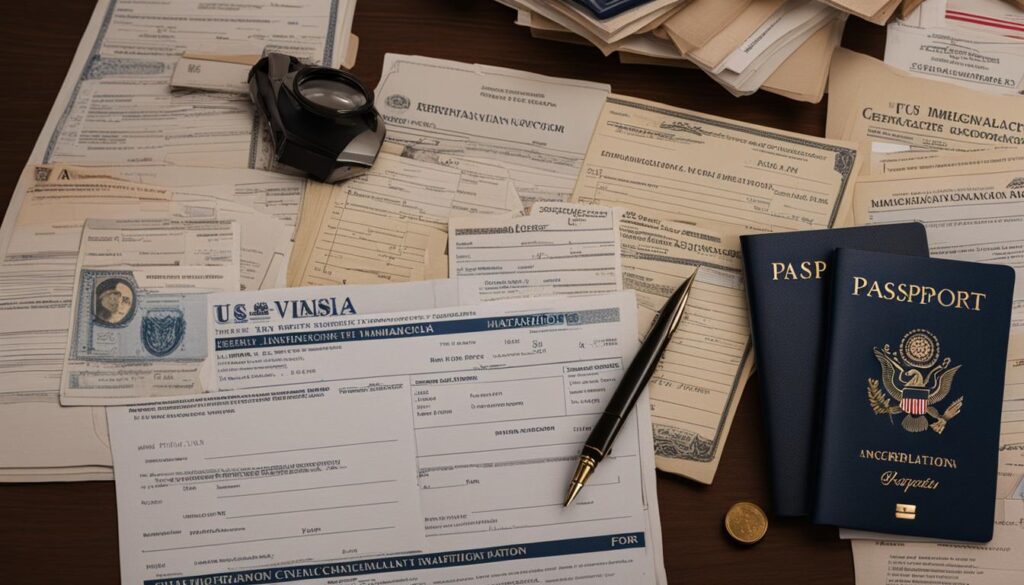The path to reuniting families across borders often leads through Consular Processing for Family-Based Visas in LA, a critical step in the US visa application process. In Los Angeles, where the tapestry of cultures is as diverse as the city itself, family immigration services strive to navigate intricate immigration pathways to bring loved ones together. This process, inherently complex, requires navigating the protocols established at U.S. embassies or consulates, demanding attention to detail and an unwavering commitment to procedure.
Understanding this process is key, from the initial application’s filing to the moment a visa is ultimately granted. Avoiding delays is possible through proper preparation, accuracy in application, and, when necessary, expedient processing requests underscored by compelling reasons. A profound grasp of the guidelines for consular processing opens up the pathway to successful family reunification in the United States.
Understanding Consular Processing for Family-Based Visas in LA
The journey towards obtaining a family-based green card through consular processing involves a multi-step procedure, distinct from the adjustment of status route. Those seeking entry into the United States must first navigate through a series of immigrant visa processing steps, starting from filing the initial petition to attending the final interview. This comprehensive overview is pivotal for applicants as they prepare for their consulate appointment requirements and pursue their family reunification ambitions.
The Basics of Immigrant Visa Application
Initiating the consular processing route begins with submitting a Petition for Alien Relative (Form I-130). Once this petition is approved, it is followed by the intricate process of transferring case details to the National Visa Center (NVC), where applicants are further screened and assigned an immigrant visa number. Understanding these steps is crucial for anyone engaged in a family-based green card application.
Roles of the U.S. Embassy and Consulates in Family Visa Process
Key to this process are the U.S. Embassies and Consulates, which diligently verify application details and conduct interviews to establish eligibility. Successfully navigating through their stringent requirements necessitates thorough preparation and adherence to the specified consulate appointment criteria.
Distinguishing Between Consular Processing and Adjustment of Status
In contrast to adjustment of status—an option available to individuals already residing in the United States—consular processing requires applicants to complete their visa processing in their home country. This procedure is characterized by additional complexity due to extensive background checks and logistic hurdles one must overcome to secure legal entry into the United States.
| Consular Processing | Adjustment of Status |
|---|---|
| Requires leaving the U.S. and applying from home country | Available to those currently in the U.S. |
| Includes an interview at U.S. Embassy or Consulate | Does not typically require an embassy/consular interview |
| Generally longer processing time due to logistical factors | May have shorter processing times as it’s within the U.S. |
| Subject to country-specific quotas and caps | Not subject to the same quotas |

Essential Documentation and Application Completeness
For individuals undertaking the US visa application process, especially during consular processing applications, there is no underestimating the crucial role of comprehensive documentation. Meticulously assembling all supporting documents is fundamental to ensuring application completeness, which is a cornerstone of successful visa procurement.
Compiling Necessary Supporting Documents
Compiling documents is a strategic step in visa application that demands utmost attention. Aside from the basic forms and personal identification documents, applicants must provide additional paperwork that supports their eligibility claims. This may include financial records, proof of relationships, or employment letters, among others. The requirement for certified translations of documents not originally in English cannot be overstressed, as it aids decision-makers in understanding the content of foreign-language materials.

Ensuring Accuracy and Completeness of the Application
The exigency of an accurate consular processing application is paramount. Every piece of information provided must be up-to-date and truthful. An oversight as seemingly inconsequential as a typo in a contact detail can result in communication breakdowns and consequent delays. A habit of thorough review and double-checking of the application form and supporting documents can save time in the long run.
| Document | Requirement | Common Errors to Avoid |
|---|---|---|
| Passport | Must be valid for six months beyond the intended date of entry | Forgetting to check expiration date |
| Birth Certificate | Must include full names of the applicant’s parents | Submitting incomplete or ineligible copies |
| Marriage Certificate (if applicable) | Must be the original or a certified copy | Failing to provide evidence of the termination of all previous marriages |
| Financial Documents | Must demonstrate the applicant’s financial stability | Not submitting supporting evidence like pay stubs or tax returns |
| Certified Translations | Required for all non-English documents | Using uncertified translators or not including the translator’s certification |
Securing an unimpeded path through the consular processing application not only involves what one includes but also how one includes it. The steps are intricate, the documentation extensive, but with precise execution, the steps advance towards a visa grant. An immigration attorney’s proficiency in this journey is invaluable — their expertise tailors the document preparation process to the highest standards expected by U.S. consular officials, markedly reducing the margin for error and delay.
Strategies to Expedite the Consular Processing Timeline
The intricate labyrinth of the consular processing timeline can often feel daunting. However, with precise strategies and knowledge of the system’s inner workings, you can enhance the chances of accelerating this multifaceted journey. Before delving into measures for expediting the application, it’s vital to understand current processing durations and acknowledge the tactical steps that could shorten the wait time for your family-based visas.
How to Check and Interpret Processing Times
To stay informed, it’s essential to regularly visit the State Department’s website and review the specific processing times listed for your designated embassy or consulate. This data offers a benchmark for the usual consular processing timeline, permitting a comparison with your case to discern any delays or acceleration opportunities. In the face of longer than standard wait times, every detail becomes critical in expediting your consular processing application.

When and How to Request Expedited Processing
It’s known that certain circumstances can propel your application to the front of the queue. If you encounter situations like a medical emergency or receive a compelling job offer in the U.S, you might qualify for an expedited interview appointment. When these exceptions arise, compiling strong, persuasive evidence is critical when presenting your case to the consular officials. It demonstrates the exigency of an expedited procedure.
Take advantage of the opportunity to communicate any changes or updates with your embassy or consulate; this proactive approach keeps you on their radar and ensures your application does not remain idly in a stack. In Los Angeles, where the expertise of immigration attorneys is readily available, their guidance can be an invaluable asset in diligently facilitating and expediting consular processing applications.
| Standard vs. Expedited Processing | Consular Processing Timeline | Required Actions |
|---|---|---|
| Standard | Variable, dependent on consulate | Monitor timelines and maintain up-to-date documentation |
| Expedited | Potentially reduced, based on urgency | Provide evidence of urgency, communicate with consulate |
In summary, while the path to expediting the consular processing application might seem obscured by layers of bureaucracy, the avenues for speeding up timelines are clear and achievable with methodical planning and assertive advocacy. The nexus between maintaining vigilance over one’s application and the judicious pursuit of acceleration options like an expedited interview appointment can make a tangible difference in the overall experience.
The Role of an Immigration Attorney in Los Angeles
When facing the complexities of the US visa application process, the expertise of an immigration attorney in Los Angeles becomes invaluable. Their involvement is often the deciding factor in streamlining consular processing, significantly increasing the chances of a favorable outcome. From conducting a meticulous review of your application to ensuring every document is in perfect order, an attorney’s vigilance can prevent common delays that could otherwise hinder the process.
Moreover, seasoned attorneys are adept at assessing situations that may merit expedited processing. They are well-versed in crafting compelling narratives and evidence to support such requests, thereby enhancing the prospects of a swift resolution. Their proactive approach extends to consistent liaison with embassies and consulates, ensuring a clear channel of communication regarding the status of your application.

At every step of the application journey, including the tense wait for an immigration decision, family immigration services provided by these attorneys are tailored to address the nuances of each unique case. Their support is not just about legal advice—it’s about providing comfort and clarity during an often emotional family reunification process.
| Service Offered | Description |
|---|---|
| Application Review | Comprehensive examination to ensure accuracy and completeness of all forms and documentation. |
| Eligibility Assessment for Expedited Processing | Evaluation of circumstances that may justify a request for faster processing times. |
| Preparation of Expedited Requests | Creation of persuasive materials to support the need for an expedited process. |
| Liaison with Consular Officials | Maintaining communication with consulates and embassies to track application progress and resolve issues. |
| Continued Support and Updates | Providing clients with the latest developments and guidance throughout consular processing. |
An immigration attorney in Los Angeles is not just a facilitator of legal processes but also a partner in your journey towards a successful and expeditious family reunification in the U.S. Their commitment to your family’s goal underlines their pivotal role in the intricate tapestry of immigration law.
Prepping for the Consulate Appointment and Interview
As you approach the consulate appointment and visa interview, it’s vital to master the consulate appointment requirements and engage in thorough US visa interview preparation. The effort you put into preparation not only meets the administrative requisites but also sets the tone for a confident interview performance. Accessing up-to-date information and planning can make a substantial difference in acquiring a US family-based green card.
Understanding Consulate Appointment Requirements
Securing a successful consulate appointment begins with a thorough checklist of necessary documents aligned with the consulate appointment requirements. This includes, but is not limited to, confirmation of visa interview appointment, valid passport, photographs, and supporting documentation like financial records and evidence of family ties. Ensuring every document is accurate and up-to-date avoids unforeseen delays or complications during the consulate visit.
Tips for US Visa Interview Preparation
Next comes the all-important US visa interview preparation. Anticipate what might be asked and rehearse clear, concise answers to common interview questions regarding your background, purpose of immigration, and your relationships with family members in the United States. It’s also prudent to organize your documents systematically for quick retrieval during the interview. This level of readiness displays seriousness and can contribute positively to the decision-making of consular officers.
- Review all necessary forms and personal documentation in advance.
- Practice articulating the purpose of your visa application.
- Arrange documents in an orderly fashion for easy presentation.
- Understand potential questions and have supporting evidence ready to reinforce your responses.
Remember, the journey toward a US immigrant visa is meticulous, but with the right approach to consulate appointment requirements and US visa interview preparation, you can navigate this process with greater ease and confidence.
Navigating the National Visa Center (NVC) Procedures
Once an I-130 petition is approved, the subsequent journey through the National Visa Center Processing framework is critical for those seeking a family-based green card. The NVC acts as an intermediary after U.S. Citizenship and Immigration Services (USCIS) approval, setting the stage for consular interview scheduling. This stretch of the visa application journey requires precision and attention to detail to ensure a smooth transition to the next phase.
From I-130 Approval to Consular Interview Scheduling
Recognition of an approved I-130 petition by the National Visa Center is a signifier of progression in the family-based visa application process. The NVC’s role in this is pivotal, as it coordinates the scheduling of consular interviews—a defining milestone for applicants. Timely and accurate submission of documentation is vital for the NVC to assign an immigrant visa number and arrange the interview date.
Submitting Visa Applications to the NVC
Preparation for submitting visa applications to the National Visa Center involves a detailed collection and submission of necessary documents following the NVC’s specific instructions. Failing to adhere to these can lead to avoidable delays. Here is a concise guide to presenting your application to the NVC:
| Step | Action | Outcome |
|---|---|---|
| 1 | Receive NVC Welcome Letter | Confirmation of case number and invoice ID number |
| 2 | Pay Required Fees | Ability to access and submit DS-260 form |
| 3 | Submit Form DS-260 | Official submission of visa application to NVC |
| 4 | Compile Documents per NVC Checklist | Preparation for document submission to NVC |
| 5 | Submit Documents to NVC | Documents under review by NVC |
| 6 | Receive Notification from NVC | Confirmation of document receipt and completion status |
| 7 | Wait for Interview Appointment | Scheduled consular interview |
Effective navigation through the NVC’s procedures not only ensures that applicant cases remain on track but also brings individuals and families one step closer to achieving their migration aspirations. Understanding each phase of National Visa Center Processing and authentically participating in this orchestrated effort leads to the penultimate stage—the consular interview.
What to Expect During the Visa Interview
The immigrant visa interview is a pivotal moment in the visa application process. It provides consular officers with an opportunity to closely examine the details of an application, assess the credibility of the applicant, and ultimately decide whether to grant or deny the visa. Stressing the attributes of preparation and honesty, this stage can have significant bearing on the outcome of a visa application approval.
Evaluating Applicant’s Eligibility and Authenticity
During the interview, applicants must be prepared to verify the information they have provided in their application forms and support it with tangible evidence. Questions may be precise and probing, serving to cross-check the data for consistency and exactitude. It’s crucial for applicants to be transparent and forthcoming with their responses, as the evaluation is integral to determining their eligibility for an immigrant visa.
Dealing with Possible Requests for Additional Information
In some cases, the consular officer may ask for additional information or documentation to clarify certain aspects of the visa application. These requests might appear during the interview or might be communicated afterwards. Being responsive and cooperative when faced with such inquiries not only reflects an applicant’s commitment to due process but also greatly enhances the prospects for a favorable visa decision.
It is paramount that applicants handle these additional information requests expediently and accurately to maintain the integrity of their visa application and increase the likelihood of approval. The ability to address such requests effectively is a testament to the preparedness and reliability of the applicant, ultimately fostering confidence in the legitimacy of their immigration journey to the United States.
Financial Aspect: Analyzing the Costs of Immigrant Visa Processing
For families pursuing the dream of reunification in the United States, understanding the financial obligations linked to consular processing is vital. The journey for an immigrant visa is peppered with various fees, that when combined, represent a significant part of the immigration endeavor. It is paramount for applicants to budget appropriately, ensuring they can cover all costs without the risk of unexpected financial strain.
Breakdown of Fees for Family-Based Green Card Application
The breakdown of fees associated with the immigrant visa application process is teeming with charges that merit thorough examination:
- USCIS Immigrant Fee: A mandatory payment of $535 is required by all applicants to process the Green Card following visa issuance and admission to the United States.
- National Visa Center (NVC) Processing Fee: Applicants are expected to settle a fee of $445 for the NVC’s role in pre-interview preparation and document processing.
- DS-260 Immigrant Visa Application Fee: Completing the online Form DS-260, the primary immigrant visa application, incurs a cost of $325.
Besides these prominent expenses, potential applicants should also anticipate ancillary costs such as those for obtaining labor certifications, medical examinations, police clearances, and possible translation services. Each of these has its own fee structure and can vary widely based on the applicant’s location and the specific requirements of their case.
Consulting with a seasoned immigration attorney in Los Angeles can prove invaluable in navigating these financial waters. Such professionals are adept at providing tailored advice, ensuring all fees and associated costs are accounted for in the overall budget. Their expertise can mean the difference between an application that moves smoothly through the process and one that falters due to financial oversights.
In summation, a meticulous approach to the Consular Processing Costs, including the USCIS immigrant fee and immigrant visa application fee, is a cornerstone of successful family-based visa applications. Prepare, plan, and consult to pave a financially solid path towards a new life in the United States.
Conclusion
Embarking on the consular processing journey for a family-based visa in Los Angeles requires a meticulous approach and a detailed understanding of the intricate US visa application system. A smooth consular processing is achievable by diligently preparing the application, being well versed in consular processing timelines, and ensuring thorough preparation for the interviews. The complexities of the green card application process necessitate patience, with attention to the guidelines provided by immigration authorities being pivotal to avoiding complications.
Ensuring a Smooth Consular Processing Journey
The intricate tapestry of the family visa process demands every detail be managed with precision and care. From accurate and comprehensive documentation to adhering to official timelines and protocols, the path to navigating smooth consular processing is rife with challenges that require careful consideration. Applicants who keep abreast of procedural updates, and remain patient and proactive, can significantly streamline their experience, mitigating the risks of potential delays or setbacks.
Seeking Assistance from Comprehensive Family Immigration Services
In pursuit of a favorable outcome within the complex legal landscape of immigration, partnering with comprehensive family immigration services emerges as a wise strategy. The guidance of an experienced immigration attorney is crucial—they bring a wealth of knowledge and resources that can simplify the process, foresee potential hurdles, and provide solutions tailored to each unique situation. This professional assistance not only eases the burden on applicants but also enhances the prospects of achieving a successful family reunification and the dream of establishing permanent residency in the United States.
FAQ
Q: What is Consular Processing for Family-Based Visas in LA?
A: Consular Processing for Family-Based Visas in LA is the method by which individuals who are outside the United States apply for immigrant visas to live permanently in the U.S. through family sponsorship. This process takes place at a U.S. embassy or consulate in the applicant’s home country or region.
Q: How do the roles of U.S. embassies and consulates differ in the family visa process?
A: U.S. embassies and consulates oversee the vetting and interviewing of applicants for immigrant visas. They verify the details of the visa application, ensure all necessary documentation is complete, and assess the eligibility of the applicant for a family-based green card.
Q: What is the difference between Consular Processing and Adjustment of Status?
A: Consular Processing requires an individual to apply for a visa from outside the United States, while Adjustment of Status is for individuals who are already in the U.S. and wish to adjust their legal status to permanent residency without returning to their home country.
Q: What documents are necessary for consular processing applications?
A: Essential documents for consular processing often include a completed Petition for Alien Relative (Form I-130), supporting identity and civil documents, financial support documents, medical examination results, and police certificates. All documents not in English require certified translations.
Q: What steps can be taken to ensure the accuracy and completeness of a consular processing application?
A: To ensure accuracy and completeness, applicants should meticulously fill out all required forms, include all necessary supporting documentation, provide accurate personal contact information, and address any additional requests for information from the consulate or embassy.
Q: How can applicants check and interpret consular processing timelines?
A: Applicants can check processing times by visiting the U.S. Department of State’s website and looking up the specific U.S. embassy or consulate handling their case. Processing times can vary and should be interpreted in the context of global and regional backlogs and individual case complexities.
Q: When is it possible to request expedited processing for a visa application, and how?
A: Expedited processing can be requested if the applicant has urgent circumstances such as severe financial loss, urgent medical need, or significant personal situations. This request must be made to the consulate or embassy with proof of the urgency and is subject to official discretion.
Q: What role does an immigration attorney in Los Angeles play in consular processing?
A: An immigration attorney in Los Angeles can provide expert guidance throughout the consular processing, including application review, expedited processing requests, and preparation for interviews. They assist in navigating complex immigration laws and consulate requirements to enhance the chances of a successful visa application.
Q: What are the requirements for a consulate appointment and visa interview?
A: For a consulate appointment and visa interview, applicants must bring all required paperwork, including the visa application, supporting documents, and additional information requested by the consulate. They must be prepared to discuss their application and demonstrate their eligibility for an immigrant visa.
Q: How should applicants prepare for the U.S. visa interview?
A: For the U.S. visa interview, applicants should familiarize themselves with potential questions, organize all their documentation, and understand which pieces of evidence will best support their case. Practicing responses and remaining calm and honest during the interview are also recommended.
Q: What are the steps involved after an I-130 petition is approved?
A: After I-130 approval, the next steps involve the National Visa Center (NVC) processing your visa application, collecting the necessary fees, and submitting the supporting documents. Once these are complete, the NVC will schedule your interview with the U.S. embassy or consulate.
Q: What happens during the visa interview, and how should applicants handle requests for additional information?
A: During the visa interview, consular officers assess the application’s details and the applicant’s eligibility. Applicants should be prepared to answer questions accurately and provide additional details as requested. This may include clarifying information or submitting additional documentation after the interview.
Q: What are the typical costs associated with consular processing for family-based green card applications?
A: Costs for consular processing include the USCIS immigrant fee of 5, the National Visa Center (NVC) processing fee of 5, and the DS-260 immigrant visa application fee of 5. Other costs may arise for medical exams or police certificates. It’s advised to budget for the entire cost of the process anticipatively.
Q: What steps can be taken to ensure a smooth consular processing journey?
A: To ensure a smooth journey, applicants should submit complete and accurate applications, stay updated on their embassy’s processing timelines, meticulously prepare for their visa interviews, and address any additional requests promptly. Seeking the assistance of an immigration attorney can also be highly beneficial.
Q: How can comprehensive family immigration services assist in the process?
A: Comprehensive family immigration services offer guidance and support throughout the consular processing journey. These services, often provided by experienced immigration attorneys, can help navigate complex procedures, manage paperwork, and bolster the chances of a successful application.

